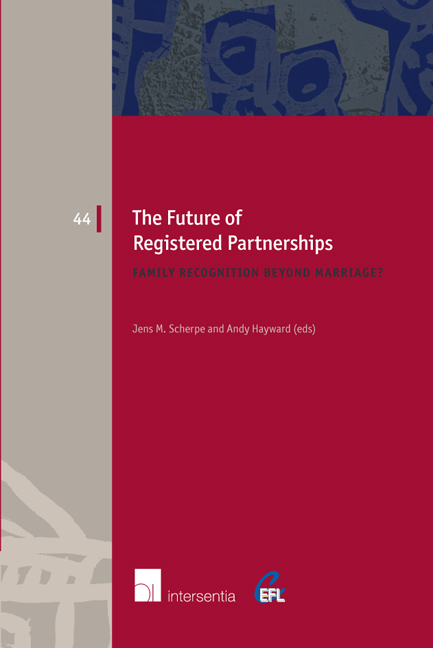Book contents
- Frontmatter
- Foreword
- Preface
- Contents
- List of Contributors
- The Future of Registered Partnerships: An Introduction
- Questionnaire
- Part I Registered Partnerships as a Functional Equivalent to Marriage
- Part II Registered Partnerships as an Alternative to Marriage
- Part III Registered Partnerships in a Time of Transition
- Part IV Alternative Models for Registered Partnerships: Beyond Conjugality, Beyond Formality
- Registered Partnerships in Spain
- Registered Partnerships in Belgium
- Registered Partnerships in Australia
- Registered Partnerships in New Zealand
- Part V Registered Partnerships, Discrimination and Human Rights
- Part VI Comparative Perspective and Conclusions
- Index
- European Family Law Series
Registered Partnerships in Belgium
from Part IV - Alternative Models for Registered Partnerships: Beyond Conjugality, Beyond Formality
Published online by Cambridge University Press: 22 September 2018
- Frontmatter
- Foreword
- Preface
- Contents
- List of Contributors
- The Future of Registered Partnerships: An Introduction
- Questionnaire
- Part I Registered Partnerships as a Functional Equivalent to Marriage
- Part II Registered Partnerships as an Alternative to Marriage
- Part III Registered Partnerships in a Time of Transition
- Part IV Alternative Models for Registered Partnerships: Beyond Conjugality, Beyond Formality
- Registered Partnerships in Spain
- Registered Partnerships in Belgium
- Registered Partnerships in Australia
- Registered Partnerships in New Zealand
- Part V Registered Partnerships, Discrimination and Human Rights
- Part VI Comparative Perspective and Conclusions
- Index
- European Family Law Series
Summary
HISTORY AND BACKGROUND
Until the late 1960s, Belgian law did not recognise or formalise any relationship between adults outside of the traditional institution of marriage.
BASIC STRUCTURES OF THE LAW ON ADULT RELATIONSHIPS
In the 1970s and the 1980s, courts gradually began to consider that de facto relationships could have some very limited legal effects. At the same time, unmarried cohabitation expanded rapidly. On the one hand, increasing numbers of opposite-sex couples did not marry while, on the other hand, same-sex couples became more visible but were unable to marry because the legal state of marriage was restricted to heterosexual couples.
In 1998, the Belgian legislature created a new minimalist status called legal cohabitation (cohabitation l e gale ; in the following used interchangeably with the term ‘registered partnership’) open to both heterosexual and homosexual couples (as well as to two adults not forming a couple). In 2003, it decided to go one step further by opening marriage to same-sex couples (but with a few fundamental differences between opposite-sex and same-sex marriage). Therefore, in Belgium both heterosexual and homosexual couples can choose between marriage and legal cohabitation (there are clear differences between the two, on which see below) or they can choose to remain de facto partners. The legal cohabitation regime is only ‘a little stronger than informal cohabitation’ and its legal consequences are ‘far less numerous than those of marriage’.
MOTIVES FOR THE INTRODUCTION OF REGISTERED PARTNERSHIPS
The law has its origins in a law proposal brought before the Belgian Parliament on 23 October 1995 by four representatives. At the very beginning of the legislative process, the proposal was about a ‘common life contract’ (contrat de vie commune) rather than ‘legal cohabitation’ (cohabitation l e gale). According to the authors of the proposal, a law was necessary for two main reasons: firstly, marriage was less attractive than it had been before; and secondly some social groups who could not marry (same-sex couples) or did not want to marry (opposite-sex couples) were asking for a legal framework for their relationship. The proposal emphasised that the common life contract differed radically from marriage and aimed only at creating an elementary guarantee for the partners.
- Type
- Chapter
- Information
- The Future of Registered PartnershipsFamily Recognition Beyond Marriage?, pp. 381 - 410Publisher: IntersentiaPrint publication year: 2017



